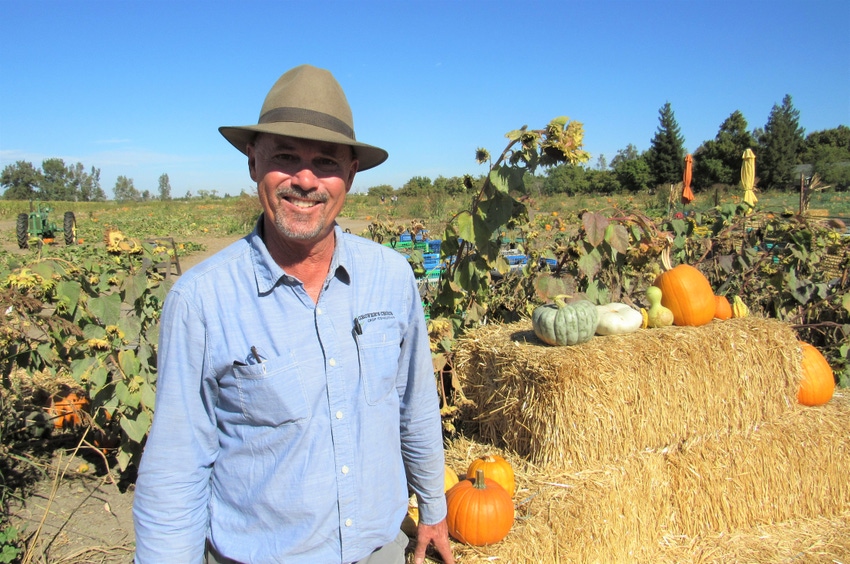
Steve Gruenwald’s main profession is pest control advisor for his own crop consulting firm, but he also grows almonds and walnuts on his small farm.
And each October pumpkins take up the bulk of his time and energy, as thousands of children, parents, and teachers visit the pumpkin patch near Orland, Calif., that’s operated by him and his wife, Becky.
The Gruenwalds opened the business — Country Pumpkins — 19 years ago when their youngest son was but a tyke and there were no other Halloween-themed attractions in the area. For Becky, a former agriculture teacher at nearby Elk Creek High School, it was a way to stay engaged with students.
“It’s not just about the kids — it’s about the adults, too,” Steve says of the attraction’s ag education component. “We see it every year, the number of people who are so thrilled to see how things grow.”
Country Pumpkins, which includes a pumpkin patch, corn maze, hay pyramid, animal barn, and general store, was the final stop on the Tehama County Farm Bureau’s 13th annual bus tour of northern Sacramento Valley agricultural businesses in late October.
FARM-CITY WEEK
The tour is held each year in conjunction with national Farm-City Week, to be observed this year Nov. 14-21. A myriad of locally organized banquets, civic club meetings, farm tours, job exchanges, and other events is geared to recognize partnerships between rural and urban communities that make food safe and plentiful, according to organizers. The movement is guided by a national board that was established in 1955, and is geared to teach city dwellers about the agriculture in their backyard.
The Tehama Farm Bureau bus tour started at Sale Orchards in Red Bluff, Calif., which grows plums for prunes, then headed south to Corning, Calif., to visit the Sunsweet Dryer and MoonBeam Farm, which grows lavender, before finishing up at Country Pumpkins.
In addition, a Farm-City Night banquet was to be held Nov. 5 at the Red Bluff Community Center.
Among the 35 bus tour participants were Kat Porovich and Casey Holland from a job training center in Red Bluff, who wanted to learn about the needs of area agribusinesses. They were wowed by MoonBeam’s operation, which is billed as the largest west of the Mississippi River for organic loofah.
LEARNING NEW THINGS
“It’s pretty impressive that it’s in Tehama County,” Porovich says.
Holland says she’s familiar with agriculture, but the bus tour enabled her to learn new things. “I grew up with agriculture, but I think it’s really neat to see different sides of it.”
Irene Fuller, a former alpaca farmer, says she’s taken the bus tour several times. “Every time, you learn something that’s extremely interesting,” she says. For instance, she was intrigued that the prune orchard uses mustard as a cover crop. “The cattle people cuss it, but it’s very useful in killing nematodes.”
Kari Dodd, Tehama County Farm Bureau executive director, says she included the pumpkin patch in this year’s tour to highlight the growing importance of agritourism. According to the University of California-Davis, more than 2.4 million visitors participate in agritourism activities yearly.
Agritourism includes educational activities, hospitality services, outdoor recreation, alternative marketing, and creation or sale of value-added products, according to the university’s Sustainable Agriculture Research and Education Program.
A BOOMING BUSINESS
“Agritourism is a booming business right now; people want to know where their food and fiber come from,” Dodd says. “We want to highlight that for them.”
Education is a key component at Country Pumpkins, where Becky Gruenwald could be seen on the day of the farm tour explaining to elementary school students how crops are grown, and discussing the importance of conserving water.
Country Pumpkins has always donated the profit it makes to non-profit organizations, such as 4-H and high school sober graduation programs, Steve says. On weekends, local 4-H members manage the corn maze, for which admission fees go into a separate till to be given to the 4-H program.
“We do a nighttime haunted maze, and that helps pay the bills,” he says. “It’s a place for kids and families that’s not all commercialed out. We’ve been asked if we wanted to scale up, but we’re not interested in getting larger.”
About the Author(s)
You May Also Like






